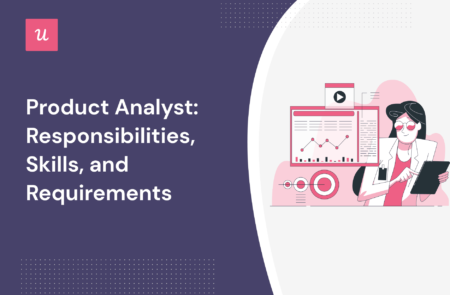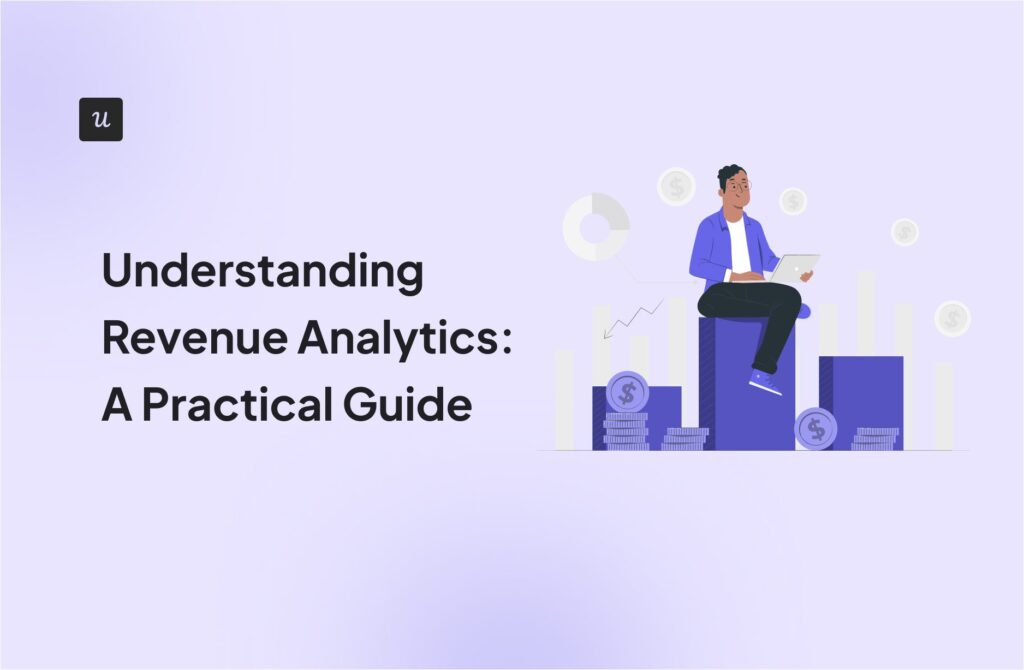
Are you aiming to become a product analyst? Or are you uncertain about the occupation but want to explore it as an option?
A product analyst needs to be able to utilize data strategically, but their job description doesn’t depend on data science degrees anymore. This change has been primarily driven by increased access to analytics tools like Userpilot that help businesses achieve product growth.
In this article, we’ll cover the responsibilities of a product analyst, the skills needed in the current job market, and the prerequisites. Let’s dive in!
Try Userpilot Now
See Why 1,000+ Teams Choose Userpilot

What is a product analyst?
A product analyst is a professional who uses data analysis and insights to assess and improve the performance of a product or service. Product analysts track market data, collect customer feedback, identify trends, and draw inferences about users’ needs and behaviors.
What do product analysts do?
The product analyst role has evolved to encompass the elements of market research, data analysis, and product management. Product analysts are now at the core of product development. Here are the primary responsibilities you will have to take as a product analyst.
- Do market research: Market research is important to study and understand industry trends, competition, and target customer needs. You can then use the insights to find new market opportunities and contribute to product development.
- Collect and analyze data: Your day-to-day role is to use data to understand user perception of a product thoroughly. It includes collecting customer feedback, studying user interactions with the product, and analyzing responses to provide timely data insights to product teams.
- Track product performance: You need to track key product performance indicators and product metrics over its lifecycle. This will allow you to identify trends and patterns that suggest how well the product performs in the market and assess product success.
- Evaluate product performance: Based on the analysis, you have to make regular product evaluations to assess its performance against predetermined benchmarks and goals. This will enable you to find areas of improvement and suggest optimization strategies to your product manager.
- Understand product requirements: You need to collaborate with relevant stakeholders to gather documents on product requirements and convert them into product specifications or user stories. You might also have to collaborate with cross-functional teams to help develop product marketing strategies and improve the user experience.
- Prepare reports and presentations: After thorough analysis, a product analyst has to create detailed reports about the findings and prepare presentations. You’ll have to use graphs, charts, and other visuals to present data in an easy-to-understand format. Sometimes, you may also need to report to senior management to justify your recommendations.
What are the skills needed for product analysts?
Here are the essential skills you’ll want to include in your resume for the product analyst position.
Technical skills
Let’s start with the technical proficiencies you need.
- Data analysis: You must collect and analyze qualitative and quantitative data from multiple sources like user feedback and product usage. It involves working with metrics, analytics tools, and techniques to draw conclusions based on the findings.
- Data visualization: You need to create easy-to-interpret visuals, such as charts and graphs, and present them in an analytics dashboard. The visuals need to summarize the findings in detail and engage stakeholders enough to consider your data-backed insights.
- Statistical analysis: This also involves collecting, analyzing, and interpreting data. However, if you know statistical analysis, you’ll be able to identify causal relationships from data and make projections. You may also need to perform exploratory data analysis, like studying new market opportunities, and make projections.
- Technical tools: Product data collection and analytics tools like Userpilot help automate repetitive tasks and boost productivity. You may have to use a combination of data analytics tools to access all the necessary features, such as Userpilot, MS Office, and Google Analytics.
Workplace skills
Strong workplace skills are important to work successfully with your product team and climb the career ladder.
- Critical thinking: Self-serve product analytics tools have made it more important to distinguish yourself by approaching a problem and thinking analytically. Quantitative understanding, attention to detail, and great problem-solving skills are now as valued as expertise.
- Project management: Your product manager might assign you projects and even have you lead some of them. You need to meet the project criteria and exhibit leadership, organization, and collaboration skills.
- Communication skills: Both verbal and written communication skills are essential for articulating your insights and giving technical explanations. These skills are also critical for pitching your solutions to management.
Business skills
Product analysts share certain skills with business analysts.
- Business analysis: Like a business analyst, you need to collect data, identify problems or requirements, and deliver solutions. You must also conduct market research, test rival products, analyze current and prospective target customer segments, and project future growth.
- Business acumen: A modern-day product analyst should know how to interpret data, understand business processes, and apply data in practical scenarios. The solutions you offer should generate business value.
What is the salary range for product analysts?
According to Glassdoor, the latest average base salary of product analysts in the United States is $77,090 annually.
The estimated additional pay, including commission, profit sharing, cash bonuses, and tips, makes the total pay $94,308 per year. The estimated median (i.e., most likely) range of the total salary is between $76,000 and $119,000.
You may not find the ‘product analyst’ role in some job listings, but notice a few variations. Here are the average salaries for these roles:
- Junior product analyst: Base salary = $70,166/year; Total salary = $79,036
- Senior product analyst: Base salary = $86,111/year; Total salary = $107,245
- Lead product analyst: Base salary = $90,314/year; Total salary = $113,292
- Market research analyst: Base salary = $63,516/year; Total salary = $71,506
What is the career path for product analysts?
A product analyst role will allow you to gain valuable skills, expertise, and experience in product marketing and management. This opens up multiple career paths for you to advance to.
People usually begin their careers as junior product analysts. You can later be promoted to senior product analyst, followed by lead product analyst.
From there, you can advance to the product manager, product marketing manager, or product insights manager role. The product insights manager earns more on average, possibly due to their greater input of insights that influence the product.
However, you also have the option to switch to a separate branch, such as data science, and pick up the career trajectory from there.
Here are the average salaries for jobs in a product analyst’s career trajectory and related paths:
- Product manager: Base salary = $111,225/year; Total salary = $146,958
- Product insights manager: Base salary = $133,841/year; Total salary = $186,254
- Product marketing manager: Base salary = $116,940/year; Total salary = $156,109
- Product director: Base salary = $151,832/year; Total salary = $236,892
- Data scientist: Base salary = $117,648/year; Total salary = $152,257
How to become a product analyst?
Let’s go over the prerequisites for becoming a product analyst.
Education requirements
There are no strict educational requirements for the product analyst role. Nonetheless, here are the common educational paths and qualifications for your undergraduate degree.
- Business management
- Economics
- Computer science
- Statistics/mathematics
It’s recommended to at least learn the practicalities of statistics and business. This can help you land better-paying jobs after graduation and gain promotions faster.
Recommended certifications
You can acquire these recommended certifications alongside your bachelor’s degree as part of the skill development process. They reinforce your knowledge of the most popular data analysis platforms, showcase your enthusiasm, and improve your hiring chances.
You can prepare for these exams via their official sites or ed-tech platforms like Coursera or Udemy.
- Google Analytics Individual Qualification: You can earn Google Analytics certification by passing this exam, which Google Skillshop offers for free.

- Tableau Desktop Specialist: Tableau offers this exam to certify your foundational understanding of Tableau Desktop.

- Microsoft Certified Data Analyst Associate: As a certified Power BI data analyst, you can work closely with stakeholders to discover business requirements.

Common tools and software
Here are some common platforms that product analysts can use or learn as part of professional development.
Data analysis and data visualization tools: The following are currently the most popular tools for storing, visually manipulating data, and creating data visuals for reporting.
- Microsoft Excel
- SQL
- Google Charts
- Zoho Analytics
- Tableau
- Microsoft Power BI

Data collection and analysis tools: These tools allow you to collect data from multiple sources, such as website/product usage, customer feedback, and interviews. They also include automated analytics and reporting functionalities to make interpretation and presentations easier.

Coding and development tools: Although these tools are related to software development, being able to use these tools allows product analysts to collaborate with UI/UX designers to enhance the product experience.
- Integrated Development Environments (IDEs), such as Visual Studio Code, PyCharm, and RStudio
- Jira

Conclusion
If you’re considering becoming a product analyst, you can work on honing your skills and applying to renowned companies after graduation. As a student, you can look for internships in analytics or related roles to make your resume stronger and more credible.
Are you already a product analyst or product manager? Book a Userpilot demo to see excellent improvements in your product and achieve product growth.







